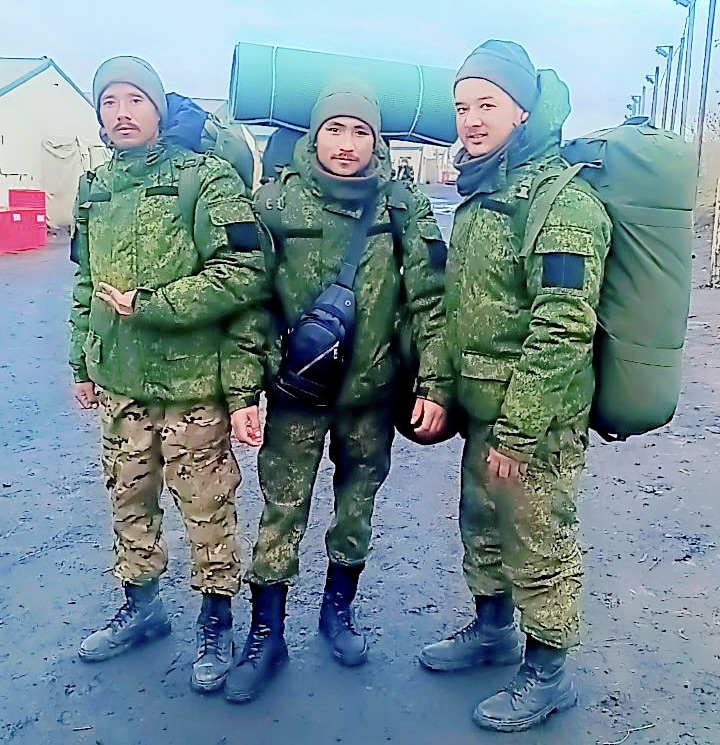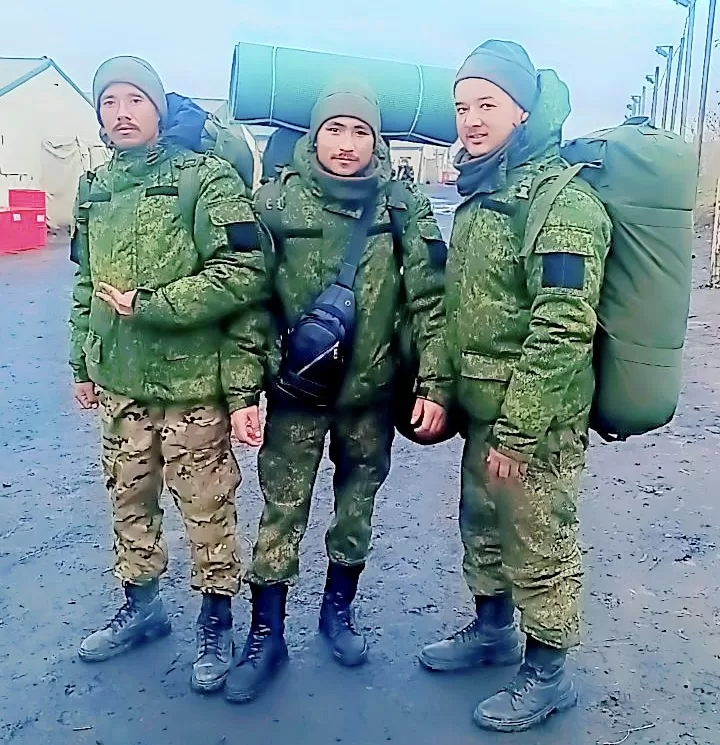Now, they are being deprived of their salaries and are being killed on the front lines – all escape routes are rife with hurdles.
Here is more about the South Asian men fighting Russia’s war on Ukraine.
Which countries do foreign fighters in the Russia-Ukraine war come from?
Men predominantly from Nepal, India and Sri Lanka have gone to fight the war as mercenaries.
In March 2022, Russian President Vladimir Putin backed the plan to allow foreign volunteers to join Russia in its war against Ukraine. Observers speculated that Russia was looking to recruit fighters from Syria. A Nepali mercenary told Al Jazeera that Nepali, Tajik and Afghan fighters are sent straight to the front line.
While the Nepali government does not have an exact number of Nepalis fighting in Russia, a foreign ministry official estimated that as many as 200 Nepalis were fighting in Russia by the end of 2023.
Some analysts estimated that about a thousand Nepali fighters have been deployed. The numbers are largely based on the complaints received by the Ministry of Foreign Affairs in Nepal from families of recruits, explained Santosh Sharma Poudel, a foreign policy analyst and co-founder of Nepal Institute for Policy Research.
The unofficial number of Indians fighting in Ukraine is estimated to be about 100, local media has reported.
Several Sri Lankans living in Russia told Al Jazeera that hundreds of their compatriots were now serving Russia’s military.

Why are South Asians going to fight the war?
Several men who went to fight the war told Al Jazeera the reason behind it was their financial circumstances. “My family’s economic condition is miserable so I thought this would be a good breakthrough,” said Bimal Bhandari*, a 32-year-old mercenary from Nepal.
The Sri Lankan men are not joining the war because they believe in the Russian cause, but because it is an opportunity to make money amid economic turmoil, said Gamini Viyangoda, a Sri Lankan writer, political analyst and columnist.
In Sri Lanka, the economic crisis and political disruption in 2022 resulted in a hunger crisis by 2023. Enormous foreign debts and rising inflation led to shortages of fuel, medication and food.
A retired Sri Lankan soldier, now a recruit for Russia, told Al Jazeera on the condition of anonymity that he was less worried about the prospect of losing his life by joining the Russian army than he was about the economic hardships in Sri Lanka.
Soldiers currently serving in the Sri Lankan army are also eager to leave their posts and go to Russia, if given the opportunity. A soldier told Al Jazeera that he makes a meagre $65 a month after tax deductions.
Poudel said that there is a trend among Nepalis to go abroad to the Middle East or Europe in search of lucrative income because “the average per capita income in Nepal is just around $1,000 per year.” In comparison, the advertised salary to join the Russian army is “about $4,000 a month, which is huge,” he added.
“Not all of them are getting the advertised amount, though the pay is significantly higher than what they would get over here,” said Poudel.
![Nipuna Silva, a Sri Lankan soldier who quit his army to fight for Russia in Ukraine because of better pay, is believed to have been killed on the frontline in Ukraine [Handout by Silva's family]](https://www.aljazeera.com/wp-content/uploads/2024/03/Sri-Lankan-in-Russia-1-1711431524.jpg?w=770&resize=770%2C513)
Which side are they fighting on?
Most South Asian recruits are fighting on the Russian lines.
However, some Sri Lankans have also fought on Ukraine’s side. After three Sri Lankan men fighting on Ukraine’s side were killed, approximately 20 others who were serving with the International Legion of Territorial Defense of Ukraine left the unit, according to Lahiru Hathurusinghe, 25, who is believed to be the only Sri Lankan still attached to the Ukrainian side.
How are South Asians recruited into the war?
South Asians looking for employment or opportunities in Europe have been being recruited through social media including calls for Nepalis, Indians and Sri Lankans to be recruited into the Russian army have been posted on TikTok.
Nepali men told Al Jazeera that when they contacted the TikTok account, they were connected to an agent running a travel agency in Nepal. Hemil Mangukiya, 23, from India’s Surat, found a job as a helper in the Russian army through a YouTube video posted by Dubai-based Faisal Khan.
The travel agencies also exacted hefty fees from the men interested in going to Russia.
A Nepali man recruited in October 2023 was charged $9,000 and in exchange was promised a monthly salary of about $3,000, along with benefits including Russian citizenship for himself and his family.
Sri Lankans were also promised monthly salaries up to $3,000 and the prospect of Russian citizenship.
Nine-year Sri Lankan military veteran, Nipuna Silva* who was already in debt, borrowed $4,000 to pay an agency that got him a job in Russia. He later joined the Russian army.
Mangukiya from Surat paid $3,600 to his recruiting agents and was offered $1,800 for a job as an assistant.
When Bhandari reached Russia, he was dropped at a recruitment camp and signed a one-year contract to fight as a soldier.
While many Nepalis headed to Russia directly from capital city Kathmandu, some were working as migrant workers in the Middle East.
How are South Asian recruits treated?
While the recruits were promised an intensive, three-month training programme, they say they received less than a month of combat drills in the Rostov region in southwestern Russia bordering Ukraine.
“I think they have been trained for very few days, in some cases not even a week,” said Poudel. “And then they are sent to the front lines, basically as expendables.”
Owing to their lack of training, Nepali men who spoke to Al Jazeera thought they would be used as backup. However, they were pushed to front lines. “The Russians just commanded us from behind. We were like their shield,” 34-year-old recruit, Ratna Karki* told Al Jazeera.
When Bhandari attempted to escape, he was caught and detained, as were many others – caught by Russia’s strict vigilance.
While Mangukiya’s parents had been assured that their son would be safe from any fighting, he was placed on the front lines.
Silva from Sri Lanka signed a one-year contract in January and on February 19, his wife received a $1,640 payment from Russia. Days later, she found out that Silva had died in a drone attack.
At least five Sri Lankan recruits have died in the war. At least 12 Nepalis have been killed, and five others captured by Ukraine. At least two Indians have been killed on Ukrainian front lines.
What is the solution?
Nepali police have already arrested people accused of smuggling mercenaries to Russia, based on tip-offs.
The Foreign Ministry in Nepal has maintained contact with the Russian government as it attempts to repatriate recruits from Nepal, as well as retrieve dead bodies. Additionally, the ministry has urged Russia to provide financial compensation to the families of the deceased.
Randhir Jaiswal, a spokesperson from the Indian Ministry of External Affairs in New Delhi told reporters that on March 8, the Central Bureau of Investigation “busted a major human trafficking network conducting searches in several cities and collecting incriminating materials. A case of human trafficking has been registered against several agents.”
New Delhi-based international lawyer and researcher, Aakash Chandran told Al Jazeera that the Indian government should repatriate the Indian citizens who joined the Russian army voluntarily, alongside those who were forced into the army.
The government is obliged to investigate and prosecute those citizens for any commission of international crime, including war crimes committed in Ukraine during their participation in armed conflict on behalf of Russia, “a country with which India is at peace”.
Chandran added that those who signed up to work as army helpers or porters, but were duped and pushed to the front lines, must be accorded the status of “prisoners of war” if captured by the Ukrainian army as per Geneva Conventions.
He said that for those unwillingly duped or forced into armed service, any contract signed is not enforceable.
However, for the people who voluntarily signed one-year contracts, things are a bit more complex.
The question becomes more diplomatic than legal, and it depends on how much the state is willing to make the case for repatriation.
Poudel said that it is also difficult to repatriate every Nepali who has gone, because some of them “go through illicit channels to Russia”.
He added that the preventive measures taken by Nepali authorities may have reduced the number of Nepalis joining the war in Ukraine, but have not stopped the flow entirely.
“In the longer term, I think as far as there are little economic opportunities at home, people would want to go abroad, seeking, better payment, better jobs and a better life. And that’s very hard to control,” said Poudel.
“Therefore, I think, in the longer term, there’s no alternative to creating opportunities at home.”
*Some names have been changed to protect the identities of individuals worried about their safety.
